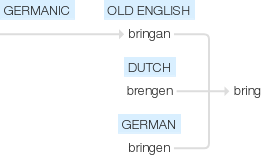Bring
Old English bringan, of Germanic origin; related to Dutch brengen and German bringen .
wiktionary
From Middle English bryngen, from Old English bringan(“to bring, lead, bring forth, carry, adduce, produce, present, offer”), from Proto-Germanic *bringaną(“to bring”) (compare West Frisian bringe, Low German bringen, Dutch brengen, German bringen), from Proto-Indo-European *bʰrenk- (compare Welsh hebrwng(“to bring, lead”), Tocharian B pränk-(“to take away; restrain oneself, hold back”), Latvian brankti(“lying close”), Lithuanian branktas(“ whiffletree”)).
Onomatopeia.
etymonline
bring (v.)
Old English bringan "to bear, convey, take along in coming; bring forth, produce, present, offer" (past tense brohte, past participle broht), from Proto-Germanic *brangjanan (source also of Old Frisian branga "attest, declare, assure," Middle Dutch brenghen, Old High German bringan, German bringen, Gothic briggan). There are no exact cognates outside Germanic, but it appears to be from PIE *bhrengk- (source also of Welsh he-brwng "bring"), which, according to Watkins, isbased on root *bher- (1) "to carry," also "to bear children," but Boutkan writes, "We are probably dealing with a Germanic/Celtic substratum word."
The tendency to conjugate this as a strong verb on the model of sing, drink, etc., is ancient: Old English also had a rare strong past participle form, brungen, corresponding to modern colloquial brung.
To bring about "effect, accomplish" is from late 14c. To bring down is from c. 1300 as "cause to fall," 1530s as "humiliate," 1590s as "to reduce, lessen." To bring down the house figuratively (1754) is to elicit applause so thunderous it collapses the theater roof. To bring forth "produce," as young or fruit is from c. 1200. To bring up is from late 14c. as "to rear, nurture;" 1875 as "introduce to consideration." To bring up the rear "move onward at the rear" is by 1708.
